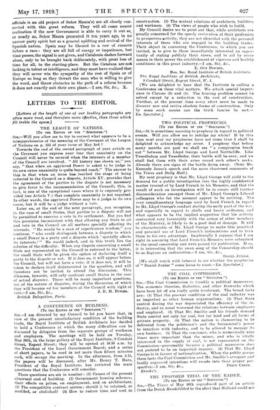LETTERS TO THE EDITOR.
[Letters of the length of one of our leading paragraphs are often more read, and therefore more effective, than those which fill treble the space.) -- THE LEAGUE OF NATIONS.
[To THE Emma or rat " Sezerma."1
Sie,—Will you allow me to try to correct what appears to be a misapprehension of the meaning of the Covenant of the League of Nations on p. 553 of your issue of May 3rd ?
Towards the end of the second paragraph of your article on the Covenant you express your fear that ummimity on the Council will never be secured when the interests of a member of the Council are involved. "All history has shown us," you say, "that when an aggrieved Power is asked to be judge in its own cause unanimity is quite beyond reach." The answer to this is that when an jostle hss. reached the stage of being referred to the Council as a dispute, Article XV. provides that the agreement of the parties to the dispute is not necessary to give force to the reconunendation of the Council; this, in fact, is one of the exceptional cases where it is expressly pro- vided (see Article V.) that complete unanimity is not required. In other words, the aggrieved Power may be a judge in its own cause, but it will be a judge without a vote.
Later on, at the end of the next paragraph, you recognize, in the case of small States, that parties to a dispute will not be permitted to exercise a veto in its settlement. But you find this provision inconsistent with that allowing any State to sit and vote in the Council on all matters specially affecting its interests. "He would be a man of superhuman wisdom," you continue, "who could distinguish between a dispute to which a small Power is a party and a dispute which specially affects its interests.'" Ho would indeed, and in this truth lies the solution of the difficulty. When any dispute concerning a small State not represented on the Council is referred to the latter, the small State will be given the option of declaring itself a party to the dispute or not. If it does so, it will appear before the Council, but will not have a vote; if it does not, it will be taken to dealers itself disinterested in the question, and will therefore not be invited to attend the discussion. This dilemma, however, will only confront small States in the case of actual disputes. There will be many important questions, not of the nature of disputes, during the discussion of which they will become ad hoc members of the Council with right of


































 Previous page
Previous page